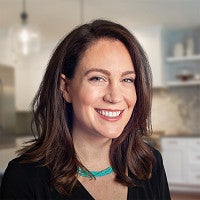Designing Organizational Strength
For Mary Miksch, MBA '21, learning new things and teaching them to others are the heart of her personal mission. After starting at Neil Kelly Company as a designer in 2013, Miksch consistently earned promotions, broadening her responsibilities at every step.
When COVID-19 arrived on the scene, Miksch was tasked with leading an effort to document and share best practices in response to the company’s PPP funding opportunity. This led to the development of Neil Kelly University, a space for stakeholders across the company to learn and share via recorded classes.
At the same time, Miksch led another key project for the organization, working with an outside consultant to create the Neil Kelly Nine: a list of accessible company values that connect team members from all areas of the organization.
The success of these two efforts led the company to promote Miksch to its director of organizational development and training—a new leadership title that was created especially for her.
In 2022, Portland Business Journal recognized Miksch's leadership excellence, naming her one of the year's Forty under 40 honorees.
Miksch believes organizations thrive when they invest in every member of the team. Now she is sharing her insights with a broader audience, speaking at professional organizations, communicating as a podcast guest, and through articles in national publications.

Mary Miksch, MBA '21
Director of Organizational Development and Training, Neil Kelly Company
Find out more about the Oregon Executive MBA
Schedule a Zoom or call with Keaton Andreas, senior associate director, executive admissions.
Q&A with Mary Miksch
Looking at the span of your career, it feels like you have always made connections between areas we think of as subjective—like design or the ethos of an organization—and areas that are more obviously driven by numbers.
I never thought of it that way, but it’s true. Even from the roots of my career in design followed by coming to a design/build firm, where I started to see all the numbers behind the emotions. That connection is one of the reasons I was motivated to get an MBA. I wanted to find ways to make the business case for more emotional or cerebral values that are important to every organization.
You earned your undergraduate degree in architecture. What was it like to pursue an MBA?
I was really surprised how much I enjoyed all of the accounting and finance classes. It was something coming into the program that wasn't directly relatable to my career or undergrad experience. The MBA program gave me a more holistic perspective on the business.
What part of your MBA experience did you find most meaningful?
The capstone experience ended up being the most enriching for me. It wasn't just an assignment. It became a way to clarify my own identity as a business person.
I approached it as an opportunity to become an expert in an area of business that was related to my core values.I asked myself “what is the story that I want to tell about my capstone and my career, and what does that story say about me?”
Tell us a little more about your capstone project.
My capstone project was something near and dear for me that I wanted to learn more about so that I could communicate it better to others. I wanted to examine the reasons why investing in our people is so important.
How do we try and calculate an ROI when it comes to professional development and retaining our best people?
I was able to look at specific positions within our company where we had hourly data that I could pull and compare to our gross sales. This was a way to look at the efficiency and productivity of a key role and how that might contribute to trends over time for our sales and profitability.
What was a top takeaway for you?
What I really enjoyed about my capstone was how much I learned about motivation and the generational transformation of the workplace. We want to keep employees because their inherent value builds up over time. And how do we keep someone? That's a whole different question and a very different answer than it was 10 years ago. I learned a lot about how the workplace has changed and why things like having a purpose and having a path matter more than ever.
What’s most exciting for you about being part of Portland Business Journal’s newest Forty under 40 cohort?
I look forward to connecting with the community that is around the award. There is so much to learn from each other within our own personal stories of growth that we can use to inspire others, and I am already inspired by my cohort.

